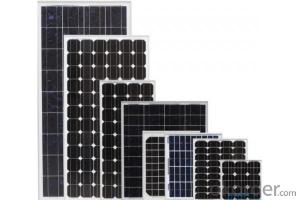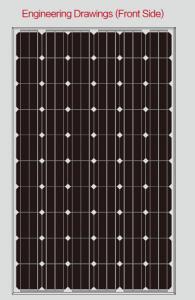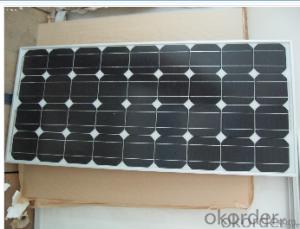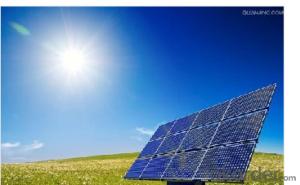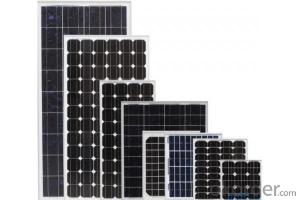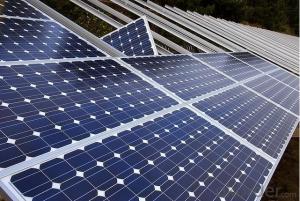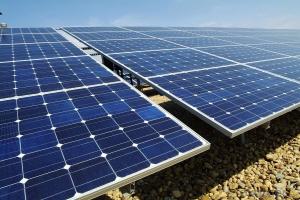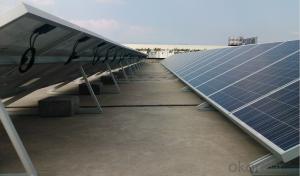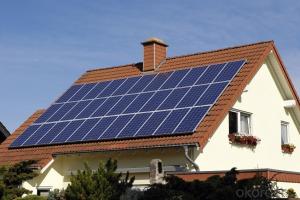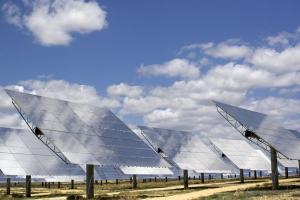Old Solar Panels High Efficiency A Grade Poly Solar Panel 60w TÜV Approved
- Loading Port:
- Shanghai
- Payment Terms:
- TT OR LC
- Min Order Qty:
- 2 watt
- Supply Capability:
- 1000000 watt/month
OKorder Service Pledge
OKorder Financial Service
You Might Also Like
Specification
China National Building Material Group Corporation
CNBM International Corporation is a professional solar panel manufacturer in China for CNBM brand . Silicon panel ( silicon module), as our main product, has high quality and good service. Our products are very popular in Europe, Australia, England, Middle East, Mexico, Argentina, Chili, Singapore and Africa.
As the whole world turns “green”, CNBM enters into the Photovoltaic Industry in 2005.After 6 years' fast growth, now our annual capacity is 500MW solar panel and 500MW solar cell.
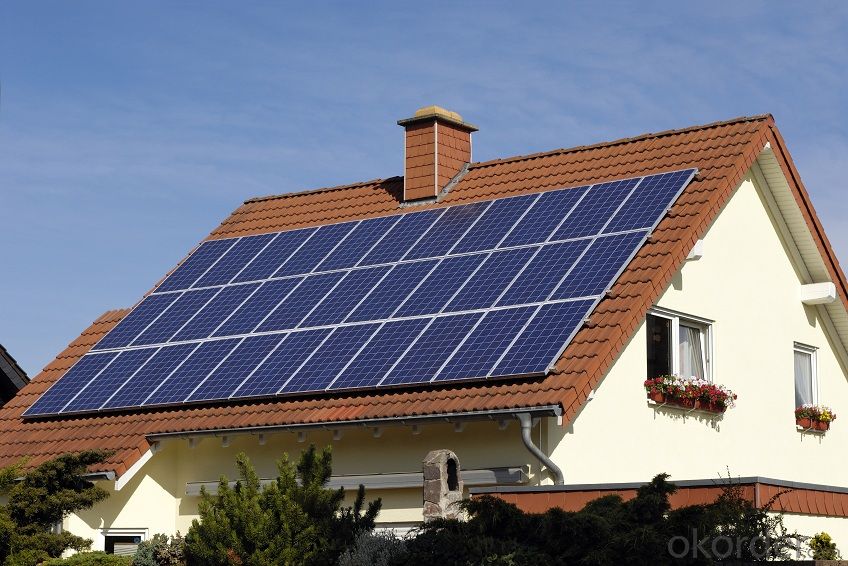
Features of our products:
• High conversion efficiency mono/poly-crystalline amorphous silicon solar cells
• Modules incorporate high performance bypass diodes to minimize the power drop caused by shading
• High transmittance, low-iron tempered glass
• High performance EVA encapsulant to prevent destroying and water.
• AI frame: without screw, corner connection. 8 holes on the frame can be installed easily
• Good performance of preventing from atrocious weather such as wind and hails
• Certifications: CE IEC TUV VDE UL, Class I
• 10 years 90% power output warranty
Characteristics of Monocrystalline Silicon Solar Panel
I Solar Cell : High efficiency crystalline solar cell. Even if under the weak light, the solar module can produce maximum power output.
II Tempered glass (toughened glass): Anti-reflecting coating and high transmission rate glass increase the power output and mechanical strength of solar module.
III EVA and TPT: Using high quality EVA and TPT to prevent destroying and water.
IV AI frame: Without screw, corner connection. 6 holes on the frame can be installed easily.
V Junction box: Multi function junction box with water proof.
VI Long lifetime: ≥25 years; Less power decrease.
VII Good performance of preventing from atrocious weather such as wind and hails.
VIII Resisting moisture and etching effectively, not effected by geology.
IX The certificate issued by international authority: UL, TUV, IEC, VDE, CE.
FAQ
We have organized several common questions for our clients,may help you sincerely:
①What price for each watt?
It depends on the quantity, delivery date and payment terms,
②What is your size for each module? Can you tell me the Parameter of your module?
We have different series of panels in different output, both c-Si and a-Si. Please take the specification sheet for your reference.
③Can you provide the peripheral products of the solar panels, such as the battery, controller, and inverter? If so, can you tell me how do they match each other?
Yes, we can, we have two companies for solar region, one is CNBM International, the other is CNBM engineering Co.
We can provide you not only the solar module but also the off grid solar system, we can also provide you service with on grid plant.
④What is your warranty system?
Our product performance guarantees for 25 years
• 12 years guarantee for workmanship
• Timeliness of delivery
• Quality Products certified (TÜV, UL, CE, ISO)
- Q: Do solar panels require regular inspections or maintenance checks?
- Yes, solar panels do require regular inspections and maintenance checks to ensure optimal performance and longevity. These inspections typically involve checking for any potential damage, dirt or debris accumulation, and monitoring the efficiency of the system. Regular maintenance checks may include cleaning the panels, inspecting wiring and connections, and testing the functionality of inverters and other components. By conducting these inspections and maintenance checks, any issues can be identified and resolved promptly, maximizing the efficiency and lifespan of the solar panel system.
- Q: I am seriously thinking about installing PhotoVoltais Solar panels (that generate electricity) on my roof. Besides the usual (cost, ROI, etc.), I was researching for the maintenance of these panels. We have tall trees around the house and needles and leaves fall on our roof all the time... not to mention the dirt and grime that collects over time.Do these decrease the capacity of the panels? Do the panels require a regular maintenance?Thanks!
- New solar panels are clean and shiny and they look cool. Then they get dirty with dust and debris caught on the wind and residues left behind by rain and birds. Solar panels must be regularly cleaned and maintained in order to keep them operating efficiently and maximize the amount of sunlight they convert into electricity. Unlike windows your solar system needs to have a clean and clear surface to ensure they are working at their maximum efficiency. If they are not at their optimum performance it means they are not producing the amount of electricity that they could be. Solar panels will attract dirt, dust, soot, pollen, tree sap and salt crystals in coastal regions creating a fine layer of grime. This layer reduces the amount of light reaching the silicon cells under the glass surface and reduces the panel's effectiveness. A solar panel that has never been cleaned could be producing almost a third less power than it otherwise could be. Some have reported a ten to fifteen percent loss of solar output due to dirty panels. From the ground the panels may appear to be clean, just like your windows. Up close however you can see the grime that has built up from the dirt and pollution in the air. A more noticeable deposit that can be left on panels is bird droppings. These tend to completely block the light from areas of the photovoltaic panel and can considerable reduce its effectiveness. See much more about solar panels maintenance below link
- Q: What is the impact of tree shading on solar panels' efficiency?
- The impact of tree shading on solar panels' efficiency is negative as it reduces the amount of sunlight reaching the panels and therefore decreases their energy production.
- Q: Can solar panels be used for powering outdoor recreational vehicles?
- Yes, solar panels can be used to power outdoor recreational vehicles. They are an efficient and eco-friendly way to generate electricity for various equipment and appliances such as lights, refrigerators, fans, and even charging batteries. Solar panels can provide a reliable source of power while being mobile and self-sustaining, making them an ideal choice for outdoor recreational vehicles.
- Q: Do solar panels require a specific type of wiring or electrical setup?
- Yes, solar panels typically require a specific type of wiring and electrical setup. They need to be connected to an inverter, which converts the direct current (DC) generated by the panels into alternating current (AC) that can be used in homes or fed back into the grid. Additionally, solar panels usually require specific wiring configurations to ensure proper grounding, protection against overcurrent, and compliance with local electrical codes and regulations.
- Q: I need to know how solar photovoltaic panels work. Anyone have a good explanation?
- Hey E Girl, photovoltiac panels are pretty simple. They start with a solid block of silicone, and shave thin layers off of them, called wafers. Once you have about 72 of them, you take half of them and dope them with boron, then the other half are doped with phosphorous. Once that's done, they take one each phosphorous and boron wafer, and glue them together with a special conductive epoxy glue, and attach a wire to each wafer. When the two glued wafers are exposed to the sun, a reaction occurs that forces free electrons from the silicone particles from one wafer onto the other, and a voltage is generated between them, about /2 volt to be exact. Once all 36 pairs are glued together, they are wired in series, connecting the phosphourous wafer from one to the boron wafer on the next, and so on. If you start with 72 wafers, you'll have 36 pairs glued together when you are done. At /2 volt each, that makes a 8 volt panel, which is used to charge a 2 volt battery. The charging source always has to have a few more volts than the battery. These 36 pairs of cells are then arranged on some kind of back board, glued down, covered with acrylic glass and mounted in a frame. There are some great websites you can go to for more info, I will list some below. Did you know that there are over 00,000 homes and businesses in the US alone that use some level of solar power to operate their electrical systems? That's good news. We actually live in one of those homes, it is powered by both the wind and sun and heated with solar and wood. I hope this answers your question, good luck, and take care, Rudydoo
- Q: I have to show in a project (a model house) how Solar Panels work. In my model I want to show Solar Panels creating electricity to power a T.V but I need to show how the power gets from the Solar Panels to the T.V. A diagram would be really helpful. Please try and make this as simple as possible as I'm only 3, but try and be specific as well!
- A solar panel is a device that collects and converts solar energy into electricity or heat. It transfers energy from the sun into electricity or heat which can be used by (for example) nearby buildings. Solar panels can be made so that the sun's energy excites the atoms in a silicon layer between two protector panels. The atoms split up and the electrons travel down wires into the home for electricity. Solar panels were in use over one hundred years ago for hot water heating in homes. Solar panels can also be made with a specially shaped mirror that concentrates light onto a tube of oil. The oil then heats up, and travels through a vat of water, instantly boiling it. The steam created turns a turbine for power. []
- Q: i've heard environmentalists like ed begley jr use the phrase quot;peak shaving hourswhen talking about solar energy.what does that phrase mean, please?thank you to all who respond.
- You okorder /... This is known as 'Grid-Tied' Solar in the open market.
- Q: Can solar panels be used in areas with high levels of saltwater exposure?
- Yes, solar panels can be used in areas with high levels of saltwater exposure. However, regular maintenance and cleaning may be required to remove salt deposits and prevent corrosion. Additionally, using materials with high corrosion resistance, such as marine-grade stainless steel, can help prolong the lifespan of the solar panels in such environments.
- Q: Can solar panels be installed on a warehouse or industrial facility?
- Yes, solar panels can be installed on a warehouse or industrial facility. In fact, these large structures often have ample roof space, making them ideal for solar panel installations. Installing solar panels on warehouses or industrial facilities can help offset energy costs, reduce carbon emissions, and contribute to a more sustainable energy future.
Send your message to us
Old Solar Panels High Efficiency A Grade Poly Solar Panel 60w TÜV Approved
- Loading Port:
- Shanghai
- Payment Terms:
- TT OR LC
- Min Order Qty:
- 2 watt
- Supply Capability:
- 1000000 watt/month
OKorder Service Pledge
OKorder Financial Service
Similar products
Hot products
Hot Searches
